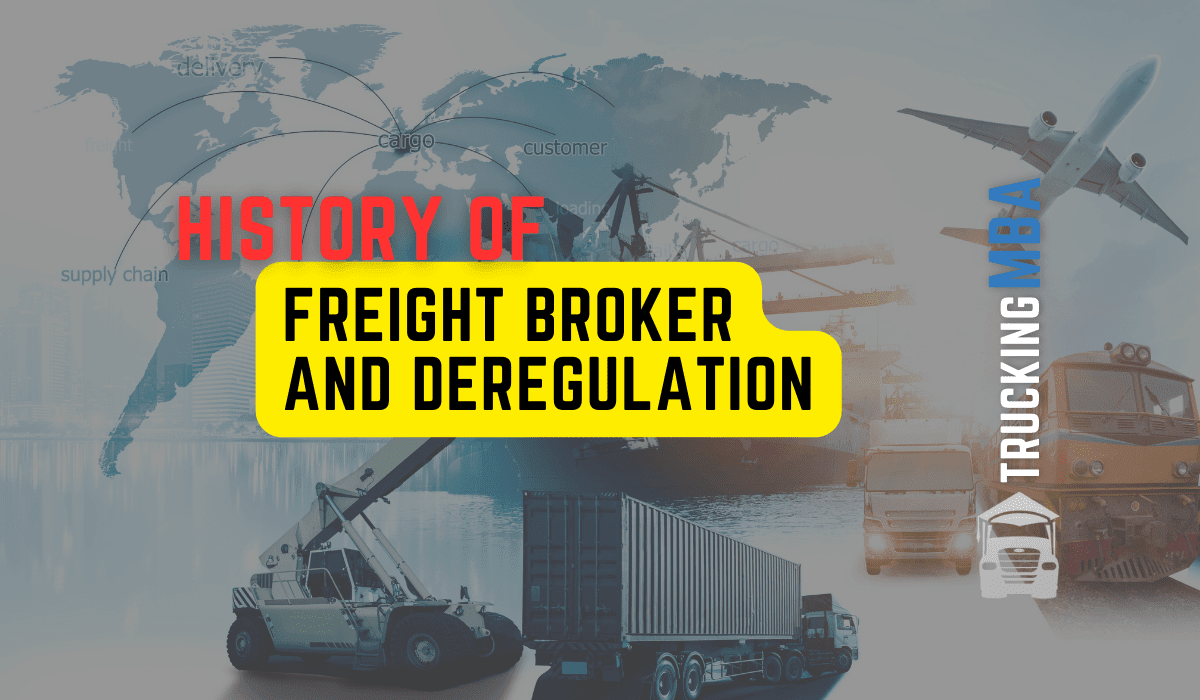Double brokering is a situation that occurs in the freight and logistics industry, particularly in the US. It happens when a carrier agrees to transport a shipment they have received from a broker or shipper, and then they subcontract the same load to another broker or carrier. In other words, the carrier “sells” the load twice, which can lead to a number of problems and risks
What is Double Brokering
- A carrier accepts a shipment from a broker or shipper
- The same load is subcontracted to another broker or carrier
- This “double sale” can lead to breakdowns in accountability, efficiency, and increased liability
This practice is concerning for new and established trucking companies alike, as it can create a breakdown in communication, efficiency, and accountability throughout the supply chain. As a US truck driver or a trucking company owner, it’s important to understand the risks associated with double brokering.
Accountability: When a carrier double-brokers a shipment, it becomes difficult to track the load and maintain proper communication between all parties involved. The original broker or shipper might not know that their load has been subcontracted, leading to confusion and disputes if something goes wrong during transit.
Efficiency: Double brokering can lead to delays and inefficiencies in the shipping process, as the load is essentially being processed twice. The second broker or carrier might not be as familiar with the shipment details, which can lead to mistakes, miscommunication, and wasted time.
Liability: With multiple parties involved, it becomes challenging to determine who is liable in case of accidents, damages, or lost shipments. Double brokering increases the chance of disputes and legal issues between brokers, carriers, and shippers.
Financial risks: When a carrier double-brokers a shipment, it can lead to inflated shipping costs, as both brokers take their commission from the shipment fee. This ultimately increases the cost for the shipper, who might not be aware of the double brokering situation.
Trust and reputation: Double brokering can damage the reputation of your trucking company if caught. Shippers and brokers value trust and reliability, so engaging in this practice might lead to losing future business opportunities and damaging relationships with clients.
To protect yourself from the risks of double brokering, it’s crucial to work only with reputable and trustworthy brokers and carriers. Be diligent in monitoring your shipments, ask the right questions, and maintain clear communication with your partners throughout the shipping process. By doing so, you can safeguard your trucking business, ensure smooth operations, and build a solid reputation in the industry.
Risks to Shippers
- Service Quality: compromised timely delivery, cargo integrity, and overall service reliability
- Liability and Insurance: complications in claiming insurance coverage or seeking appropriate recourse
- Financial Implications: unexpected additional costs due to paying multiple parties
Service Quality: When double brokering occurs, the quality of the shipping service might be compromised. This can lead to problems with timely delivery of goods or maintaining the integrity of the cargo. In this scenario, the primary trucking company or broker is not directly responsible for the shipment, which can result in a lack of accountability and reliability in the overall service.
Liability and Insurance: Double brokering can also create complications when it comes to insurance coverage and liability. If a shipment is damaged or lost due to poor handling or delays, it can be difficult to determine which party is responsible for the issue, making it challenging to claim insurance or seek appropriate recourse. This can leave the initial shipper, such as a new trucking company, at risk for financial loss or damage to their reputation.
Financial Implications: Lastly, double brokering can lead to unexpected additional costs for shippers. When multiple parties are involved in the shipping process, it’s possible for a trucking company or driver to end up paying for services from more than one provider. This can result in increased costs and financial burdens that may not have been anticipated when the shipment was initially arranged.
Risks to Carriers
- Reputation Damage: loss of trust and credibility in the industry
- Payment Issues: disputes, delayed compensation, or non-payment
- Legal Consequences: litigation, fines, and potential loss of operating licenses
Carriers, such as small trucking companies or individual truck drivers in the United States, may face if they engage in double brokering. Since double brokering is an unethical and often illegal practice in the transportation industry, involving a broker hiring another broker, instead of a carrier, to transport a load. This can lead to several negative consequences for the carriers involved:
Reputation Damage: Carriers who are involved in double brokering, either intentionally or accidentally, may suffer a significant loss of trust and credibility within the industry. This could potentially result in fewer or lower-quality job offers, as clients might be wary of collaborating with carriers associated with such practices.
Payment Issues: Double brokering can give rise to a broad range of payment-related problems for carriers, as money has to pass through multiple parties before reaching them. Carriers may face disputes with brokers over the agreed-upon rates, late payments, or even instances of non-payment, significantly impacting their financial stability and ability to grow their business.
Legal Consequences: Double brokering can expose carriers to legal risks and penalties. They may be subjected to lawsuits, and fines, and in some cases, may even lose their operating licenses. This could effectively put the carrier out of business, and make it very difficult for the truck driver to find future work in the industry.
It is essential that truck drivers and small trucking companies in the United States understand these risks and avoid becoming involved in double brokering situations. By working with reputable brokers and understanding the implications of unethical practices, carriers can better protect their businesses and maintain a strong standing within the industry.
Risks to Freight Brokers
- Reputational Damage: loss of standing within the market
- Regulatory Compliance: investigations and penalties from regulatory bodies
- Legal Liability: compensation for financial losses, damaged cargo, or breached contracts
- Financial Implications: unexpected additional costs and lost business opportunities
Reputation Damage: Freight brokers should be aware of several potential risks associated with their business operations. One of the significant risks is reputational damage. This means that a freight broker’s standing within the market may be negatively impacted if they do not maintain high standards for their service, or if their actions are perceived as unethical or unprofessional. Losing credibility among clients and partners can make it difficult for a freight broker to maintain current business or secure new clients, which can lead to lost revenue opportunities and a shrinking customer base.
Regulatory Compliance: Another risk for freight brokers is ensuring compliance with various regulations that govern their industry. Regulatory bodies oversee the activities of freight brokers and may impose investigations or penalties if they find violations of established rules and requirements. Non-compliance can lead to fines, increased scrutiny, and even the suspension or revocation of a broker’s license. This can directly harm a freight broker’s ability to operate and may also result in reputational damage.
Legal Liability: this another concern for freight brokers. This risk arises when there is a possibility that a broker may be held responsible for financial losses, damaged cargo, or breached contracts. If a freight broker is found liable in a legal dispute, they may be required to pay compensation or face other financial consequences. This can significantly impact the broker’s bottom line and may also deter potential clients from doing business with them in the future.
Financial Implications: This poses a risk to freight brokers. Operating a freight brokerage firm involves managing various costs, including overhead expenses, insurance premiums, and payouts for damages or losses. In some cases, brokers may also face unexpected costs, such as legal fees or increased insurance rates. These can put a strain on the broker’s finances and may limit their ability to invest in new opportunities or expand their business.
Freight brokers must be mindful of risks associated with their profession, including reputational damage, regulatory compliance, legal liability, and financial implications. Understanding these risks can help brokers take appropriate measures to mitigate potential consequences and protect their business. For truck drivers working with freight brokers, being aware of these risks ensures you choose a reliable and trustworthy partner for your trucking business.
Real-Life Examples of Double Brokering
Carrier Caught in the Middle: An unsuspecting carrier became involved in a double brokering scam when they delivered a shipment with missing items. Both the original broker and the unauthorized intermediary blamed the carrier, damaging their reputation and causing other customers to question their service reliability.
Broker Busted for Deception: A freight broker was caught engaging in double brokering, resulting in legal action by the shipper. The broker was forced to pay damages for financial losses and compensation for the shipping delays caused by their deceptive practices.
Broker Busted for Deception: A freight broker was caught engaging in double brokering, resulting in legal action by the shipper. The broker was forced to pay damages for financial losses and compensation for the shipping delays caused by their deceptive practices.
Conclusion
Combating double brokering in the freight industry is critical to ensure the safety and efficiency of the supply chain. By promoting transparency, adhering to industry standards, and fostering trust among all parties, the risks and dangers of double brokering can be minimized.



Responses
Yes, in factoring, when processing I’ve had to help a few clients to get paid from these type of loads, sometimes, if you are being victim of these type of loads, the earliest you find out and contact the shipper and receiver, more probabilities you have to be considered and paid, otherwise, say bye to your fuel money and time.
So I have been hit twice on this and wondering if I am out the $7k or if there is a way to recover this without having to pay 50% of what is collect to one of these collection companies?
Feels like they are in bed with these people.
This is a challenge. The companies we have worked with in the past have been at this a while and while it feels expensive, they do work on contingency so they will only get paid up to 50% of the original amount based on what they recover.
So if it was a $1000 invoice and they recover $750, then they only get $250.
Also, I have worked with some that when the amount of the invoice is higher, the will negotiate a lower percentage or a fixed fee based on recovery amounts.
Comments are closed.